The Kite Runner
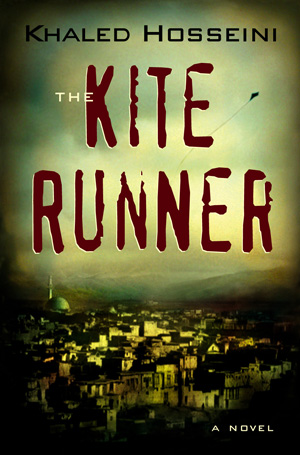 The Kite Runner by Khaled Hosseini
The Kite Runner by Khaled Hosseini
—–
It’s not like me to read award-winning books, unless they’re YA fiction of some kind. But my wife read this book and told me that I had to read it. That was enough of an incentive for me.
By now, I think everyone knows about this book, one way or another. Either you heard about it after its release, or you heard about “them” making a movie out of it, or you heard the controversy surrounding the release of the movie. One way or the other, I’m guessing that this is old news for much of you. But if you’ve heard about the book, and relegated it to the periphery of your interest, then start thinking about it again, because this is a good book to read.
The last book I read that had this feel to it was The Book Thief by Marcus Zuzak. Both books have a very tragic feel, but it’s very much a foregone conclusion as you start the book that these will be tragic stories: One is set in Nazi-occupied Germany; the other is set in Afghanistan. You don’t have to be a history or political science major to get the implications of those settings. Despite the inherent tragedy of the stories, though, each is a hopeful analysis of human nature. Sometimes we just have to make it through some of our darkest moments to make it to that grace.
One last aside, and then I’ll get to the story: A few years ago, I read a neat essay about the movie The Shawshank Redemption. The author said that the movie was a great pick-me-up movie. She anticipated the scoffing, and went into her “No, really!” mode. The caveat was that you had to make it through the entire movie to reach the payoff of the pick-me-up. And she’s right. The Kite Runner is one of those kinds of books.
The Kite Runner is about loyalty, courage, and redemption. It’s about suffering some of the worst things in the world, but only vicariously. It’s about friendship, family, faith, and endurance. It’s about the human condition. It’s … well, it’s hard to really pin it down. I expected a character-driven story when I started the book, and was surprised when it seemed to have a compelling plot. But regardless of the story’s drive, it was a book that I couldn’t stop reading. It haunted me with its imagery, and kept me thinking about the characters. I played the “What will happen?” game when I was away from the book. At first I liked the main character. Then I hated him. And then I liked him again. It was a tough ride.
This is also a book with some brutal imagery. This is a book set in Afghanistan, partly during the Taliban rule, so it comes with all the territory you would imagine from that setting. This is what makes the book tragic, but as I mentioned above, the book wouldn’t have its redeeming, hopeful outlook without having to trudge its way through the tragedy.
If you’ve put off reading the book, do so no longer. It’s definitely worth reading, despite what your usual reading proclivities may be.
Intruders
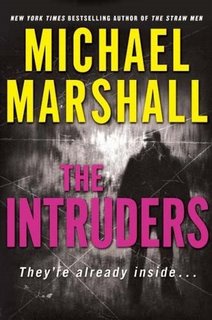 Intruders by Michael Marshall
Intruders by Michael Marshall
—–
I’ve written about Michael Marshall before on this blog, so there’s no point in re-hashing his dark, nihilistic outlook on life. Let’s just say that it’s present in this book here, contrasted nicely (and not a slight bit oddly) by his apt observations on humanity. This is a man who knows people, and probably has a good finger on what makes them work. He’s also depressing as hell, and when you’re already in a funk, he’s probably not the best man to turn to.
The fact is, I’ve been pretty quiet lately. The blog hasn’t been that active lately, and according to my records, this is only the third book I’ve read this year. That’s not so good for me. I’ve moved to a different state, and moves being what they are, I’m still adjusting. That I’m still adjusting six months after the move is indicative of my current mental state. I’m not suicidal, but I am down, in a funk, what-have-you. So my reading has seen a decline lately.
The last two books I’ve chosen to read have NOT been the proper selections. They’re both fairly dark and hopeless. Now, my wife wants me to read The Kite Runner, so I’m sure I’ll be a devastated wreck at the end of that book. After that, I plan to read some My Pretty Pony and Karen Kingsbury books.
No, not really; I’m not THAT desperate.
As dark as he is, Michael Marshall is a good author. His stories are always tense and compelling, and the darkness gives them a more serious edge than the typical thrillers you might encounter among the bestsellers. In this one, an ex-cop is approached by an old high-school friend, now a lawyer, who is trying to unravel a mystery concerning a man whose family was murdered, the experiments he was running in his basement, a missing ten year-old girl, and a vast conspiracy dating back hundreds of years. Anyone who’s read Marshall before will know that conspiracies are nothing new in his world, so this should coma as no surprise to those readers. Shoot, that isn’t even a spoiler; it’s pretty plain from the get-go that something vast is underway. True-to-form, it gets your attention and will keep you reading.
Unfortunately, the explanation for it all is pretty lame. That doesn’t come into play in the novel until the last 75 pages or so, so there’s a lot of good stuff to get through before you get there, but for all that set-up, you might wonder why the pay-off is so small. It will require a significant suspension of disbelief to accept it, and maybe because of the tone of the novel, I was less likely to find it acceptable. Who knows? Just be prepared for some disappointment.
That being said, the final ending (the denouement, maybe?) will leave you unsettled, like a good horror novel should. Depending on how vivid your imagination is, you might find yourself wondering how real the events are. It gets a little under your skin and into your brain, and if only for that being so effective, the disappointing explanation works. Like Hot Fuzz becomes a pastiche of itself just as you think that the story is too ludicrous to contain itself, The Intruders manages to pull out something deep and affecting from what appears to be stupid and contrived. So despite my reservations, I’d recommend the book.
Just make sure you have the Prozac ready before reading.
Deeper
 Deeper by Jeff Long
Deeper by Jeff Long
—–
Nowadays, it’s not enough to have a hit idea in entertainment; you have to have a hit ranchise. Witness the success of movies like The Matrix or Pirates of the Caribbean, which were then followed by the plodding, nonsensical, self-gratifying, pretentious, convoluted messes that were the sequels. Even worse, think back to how the second movies in these “sagas” ended — with a ridiculously-placed cliffhanger which served only to draw people back to the theaters for the last movie in the series. Moviemakers can talk all they want about how the movies were intended to be a trilogy from the get-go, but if that’s the case, then why do the first movies seem self-contained and innovative, while the last two movies seem to be one story, with no clear direction or innovation? I think it has more to do with the money.
Cynical? I won’t deny it. And why am I bringing this up in reference to Deeper? Well, I’m seeing the same sort of pattern here. The Descent was a pretty fun book, hardly anything to win awards or significant recognition, but for a beach read, it was enjoyable. Deeper tries to pick up where The Descent left off, and I suppose in that respect, it succeeds. It’s a darn shame, though, that that’s the only way that it succeeds.
This book plods. The real crux of the novel begins after the 100 page mark in the book, which means that the first 100 pages deal with exposition. This is odd by itself, since this is a sequel, but perhaps the author didn’t want to lose any new readers by not having the proper background. If he did it well, I wouldn’t complain all that much, but the characterization is weak and even cliched. Even for characters that I already knew and related to, they were hard to care about the second time around.
This book preaches. Instead of making it a light, fun romp like the prequel, the author tries to give it some heft and meaning by making it relevant and timely. It doesn’t even fit with the story. The angle only serves to draw the reader out of the story and wonder what the author is trying to convey. If it had any real bearing on the rest of the story, the political overtone of the novel may not feel as forced, but that part of the story is told through soundbites and asides, and never has much significance to the action and events.
This book contrives. Much of the progress of the plot hinges too much on coincidence, and it’s hard to feel compelled to finish a story when you feel like the author is dragging you along without a real reward for your commitment. If it made sense, and tied together neatly, the effort would be worth it; as the book stands, though, it’s just a mess. Characters change motivations whenever it suits the author, not when it suits the plot. It’s distracting, and careless.
This book panders. It wouldn’t be so bad if we were allowed to take the events seriously at all, but it seems dumbed down. The cliffhanger ending, where little is left resolved, makes me wonder if this was written strictly to pad out the story to make the story into a saga, as opposed to a novel.
Long can write a good, powerful, effective story. The Reckoning was one of those novels that sneaked up on me without pretension, kept me reading despite my reservations, and then hit me with an ending that was similar to being punched by Mike Tyson. The talent is there. It’s just not evident through this book.
The Descent is a fun read. If you like James Rollins and Preston/Child, there’s a lot in the story that will keep you engaged. If you’re dying to read an adventure novel about a subterranean civilization that makes the myth of hell come alive, then find that book and read it. Once you’re finished, though, resist the temptation to read the sequel. There are too many other good books to waste your time reading it.
Extras
 Extras by Scott Westerfeld
Extras by Scott Westerfeld
—–
With The Last Days, Scott Westerfeld revealed himself to be someone who isn’t averse to revisiting a “finished” story and fleshing it out a bit more. With the success of the Uglies trilogy, I suppose I shouldn’t be surprised that he went back to add a little more to the story. I suppose I should, instead, ask if it was necessary.
Extras picks up a few years after Specials left off, when Tally Youngblood instituted the “mind rain” that cleared everyone’s minds of … well, you know, I shouldn’t mention that specifically, JUST IN CASE you haven’t read that far into the series just yet. Let’s just say that Tally was a hero, everyone’s happy, and the world is a better place to live. That’s not a spoiler, is it?
Anyway, this time Aya Fuse is the protagonist, and she lives in a Japan that has been much changed by Tally and her eco-revolution. Here, currency is based off of popularity, where the more popular you are, the more clout you have in society, so people are obsessed with their rankings in the city. Aya is one of those obsessed people, and she has her sights set on becoming more popular through her stories. She’s what passes for a journalist in this era, and the more popular her stories are, the more famous she’ll become. And, of course, the story that she thinks she’s breaking becomes more complicated and complex, which, naturally, is the story of Extras.
If you’re a fan of Westerfeld and the Uglies series, then you’ll read this book. And to be honest, you should read this book. It follows a natural progression from the end of Specials, and it’s a unique look at a possible future. Just don’t be looking for something with the power and effect of Uglies, if only because it’s been done before. Unlike The Last Days, Extras actually does belong in the Uglies universe, as the results of that series spur forward the events in this novel. It just lacks the originality and message of the original series, if only because Aya, as a character, is less interesting.
Tally was unsettled at the beginning of her journey. She thought she knew what she wanted, but she was hesitant and unsure. Aya is different; she’s all about wanting to be popular (an important motivation in a YA book, I suppose) and moving her face-rank along, and she goes to some slightly unethical means to do so. She’s less sympathetic, and a little harder to root for. She comes around, as most protagonists do, but there’s still that lingering selfishness that makes her a sort of antithesis to Tally. But, as the author mentions himself, this isn’t considered part of the Uglies trilogy, but is instead an additional story in that universe.
Another thing that bugs me about the book is some of the language Westerfeld uses. Things are “brain-missing” or “truth-missing,” instead of “stupid,” “dumb,” or “a lie.” I think the author’s intention is to create a sense of other-worldliness to the story to firmly make it a science fiction story, but the setting and technology do well to do this already, and I found this use of language jarring. It took me out of the story. This sort of language was present in the Uglies series as well, so this is nothing new; it’s just something that I noticed more strongly this time around.
So, the final tally (ha!) is that this is a decent book, is worth reading, and follows logically from the series that precedes it. It’s not quite as interesting as that series, but it’s still a compelling read that leaves you with questions answered and unanswered. That’s a heck of a lot more than I can say for The Last Days.
InterWorld
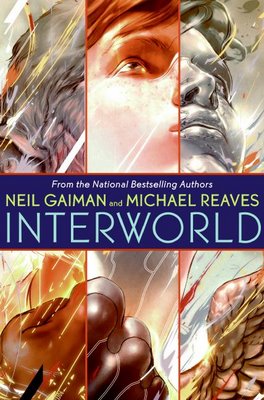 InterWorld by Neil Gaiman & Michael Reaves
InterWorld by Neil Gaiman & Michael Reaves
—–
I’m always a bit shocked when a Neil Gaiman book manages to make a public release without me knowing about it. I wonder if I’m paying close enough attention to the blogs and journals that let me know about new releases. I mean, it’s Gaiman, and I didn’t know about it? What network did I miss?
InterWorld is a juvenile novel, not even a YA novel, though, and that might be how I missed it. I almost missed out on M Is for Magic, and I remember the first time I saw Coraline was long after it had been originally released. At least, that’s the story I’m telling.
InterWorld tells the story of Joey Harker, a young boy who discovers his ability to walk between similar worlds. There’s a theory in quantum physics that predicts that any time a serious enough decision is made, the world splits at that point, and creates one world that goes off in the direction where the decision goes one way, and one world where the decision goes off in another direction. Both worlds exist independently of each other, and each is equally valid and true. Of course, this doesn’t mean that a world splits off whenever you decide to eat cereal for breakfast instead of eggs, but it could mean that The Man in the High Castle may exist as nonfiction in another dimension.
Joey is a Walker, and can move between all those worlds. He’s also the most powerful Walker in existence, so he suddenly becomes the most popular guy in the InterWorlds, since the good guys, the bad guys, and the bad bad guys all want him for different reasons. It’s all a bit hokey and convoluted, and also a bit contrived and forced. It’s also awfully convenient in points, and shallow, and two-dimensional (ironically), and….
Well, if you’re a Neil Gaiman fanboy, nothing I can say will stop you from reading this book, except maybe this: This is not a Neil Gaiman book. I say this partly because this simply doesn’t read like a Neil Gaiman novel. I haven’t read much by Michael Reaves, but I’ve read a lot of Neil Gaiman, and think I can say with certainty that this is much more a Michael Reaves book than it is a Neil Gaiman book. I think a certain part of me wants to say that it’s a Reaves novel because it’s just so bland, but that’s really not why I say that. The book lacks a certain charm that Gaiman puts into his writing, and the language used doesn’t seem to be similar to that which Gaiman uses. A footnote at the end of the book details that the story is over 10 years old, and was put together as a novel over a long weekend after existing first as a television proposal. It doesn’t specify who served as the idea man, and who did all the grunt work, but it’s pretty obvious after finishing the book.
Look, remember Lady Justice? Teknophage? Mr. Hero the Newmatic Man? They all served to prove that a Neil Gaiman idea could not turn into a Neil Gaiman story unless Gaiman himself wrote the words. Unfortunately, InterWorld proves the same point. The book isn’t a complete disaster (for the target age group, the story probably works quite well), but if you’re looking for good Gaiman fiction for kids, look for M Is for Magic or Coraline, instead.
Mister B. Gone
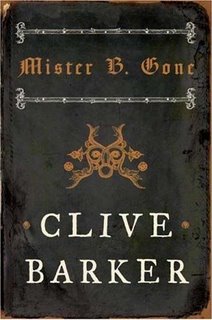 Mister B. Gone by Clive Barker
Mister B. Gone by Clive Barker
—–
For a while, I thought that Clive Barker was going to give up on standard horror novels. What with the popularity (and brilliance) of the Arabat series, paired with the success of his earlier dark fantasy novel for a younger audience, The Thief of Always, I thought maybe he was going to take the route of other horror authors, and focus on writing for teens. Mister B. Gone marks his return to adult horror, and I’m pleased to say that it’s pretty good.
Barker has always been a little hit-or-miss with me. On the one hand, I enjoy his knack for finding the disturbing without having to be grotesque about it. One of my favorite scenes from any novel is the way that one creature’s eyes from Arabat crawl around on his face like insects, and even have the ability to crawl right off his body, and still see for him. It sends one of those pleasant shivers down my spine, because it genuinely creeps me out, without being violent or graphic. What’s odd about saying that is that Barker is known for being a progenitor of the “Splatterpunk” genre, where the graphic, detailed, violent imagery is as much a character of the stories as the people populating them. So, in a way, part of me enjoyed the YA-focus of his other novels, since it seemed to distill the violence down to something more effective. But that’s where it has always been hit-or-miss with me.
Mister B. Gone hits and misses, as well, for the same reasons. The hit is a good one, and is the main premise of the novel: A demon is speaking to us from within the prison of the very book we’re reading. In fact, it’s not really a book we’re reading, as it is a story we’re hearing told from the demon himself. Barker uses this premise to full effect, finding ways to disturb us with this connection. Just as we start to lose ourselves in the story, the demon comes back to speak to us, directly, and reminds us that we might have to pay a small price for hearing this story. It works, and it works well. I don’t think it will have anyone convinced that the premise could possibly be true, but like any good horror novel, it will make you wonder if you shouldn’t be listening to the demon’s entreaties a little more seriously….
The miss, though, is in the violence. Graphic depictions seem unnecessary to me, even when they fit in with the stories (Charlie Huston, I’m looking in your direction…). In this story, oddly enough, they seemed gratuitous, even if they were supposed to be spoken by a demon. Those moments were gross-outs, not creep-outs, and I always prefer the latter to the former. Gross-outs are cop-outs, to me, and are a cheap way of being “horror” when you can’t find enough of an emotional connection to truly frighten someone. It’s like the difference between the movies The Haunting and Friday the 13th; one is an effective story of psychological manipulation, while the other is just a slasher flick.
Luckily, the violence isn’t as over-the-top as it could have been, and the premise of the story carries it well enough to compensate for what violence is in the book. If you’re looking for a good, short scare, this might fit the bill. It’s a good read that won’t keep you thinking for too long after the story ends, but the short time that it will take you to finish the book will more than make up for that fact. It’s no Imajica or “In the Hills, the Cities,” but it shows that Barker hasn’t lost his touch just yet.
Bad Monkeys
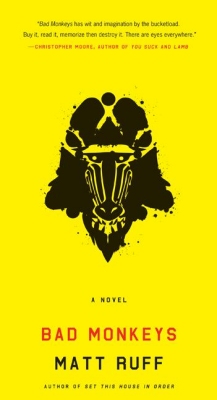 Bad Monkeys by Matt Ruff
Bad Monkeys by Matt Ruff
—–
OK, I’m not dead. I don’t know if anyone was really worried, but given that it’s been over two months since I posted here, I thought I would get that out of the way. I just couldn’t seem to find the motivation to read anything, including the latest Neil Gaiman book, which seems to mostly be a Michael Reaves book, since the two of them wrote it together. I mean, I’ve started it (as you can tell), but I’ve stalled out. But a new Matt Ruff book might be the impetus to get me going again.
I discovered Matt Ruff through Sewer, Gas, Electric: The Public Works Trilogy. If you haven’t read that one, find it and read it. It’s wacky and subversive, and brilliantly plotted. Set This House in Order, the follow-up (though not a sequel) was several years in the works, but well worth the wait. It had so many red herrings and false leads that it read like a mystery-thriller, though it said much more about people and their relationships. Bad Monkeys was a book I eagerly awaited, and I was pleasantly surprised when I received notification that it was ready for me at the library.
It reads just like a good book should read: It’s tight, well written, compelling, and interesting. It has the same sorts of characteristics that made Set This House in Order one of the very few books that kept my wife up past midnight. And like that book, it read more like a mystery-thriller than impressions suggeste. At first, I thought it might be a “more of the same” sort of book, at least in style, but the plot is so different and so strange that it stands alone.
Bad Monkeys is about a woman named Jane Charlotte, who has been interred into a psychiatric institution, due to her possible schizophrenia. She relates the story of the events that brought her to the institution to her therapist, who is (obviously) doubtful of the accuracy of her story. And the author gives us many clues along the way to make us wonder who’s telling the truth, who’s really who they say they are, and if we’re reading along to another version of Fight Club. There are so many twists and turns in this story that it’s possible to get a little lost among the paths, but Ruff is a talented guide, who takes us to an end that may not be obvious, but is certainly satisfactory.
Unfortunately, Bad Monkeys isn’t this author’s best work. I still have to give that designation to Sewer, Gas, Electric, just because it’s the most original book he’s written (and possibly the most original book I’ve read in the past 15 years). But he is a skilled, talented author, and if you like stories with a great deal of suspense, a lot of “What the heck is going on?” moments, and want to read a compelling story that will keep you guessing, Bad Monkeys is a good place to start. Just make sure you work your way back through his catalog. You won’t be disappointed.
M Is for Magic
 M Is for Magic by Neil Gaiman
M Is for Magic by Neil Gaiman
—–
Ever have those days where you put on an old jacket from last winter, and find a $20 bill in the pocket? That’s how I felt when I first heard about M Is for Magic. I didn’t know that Neil Gaiman had a new book coming out, much less that he had pulled a Ray Bradbury by picking some of his stories appropriate for younger audiences, and packaging them together under a new title. Shoot, he even acknowledges Bradbury in the introduction and in “October in the Chair,” so it’s no surprise that he even adopted Bradbury’s old title format for the collection. Bradbury had R Is for Rocket and S Is for Space, and now we’ve covered the Ms, as well.
So, the reality is that if you’re a hardcore Gaiman fanboy, then you’ve read most all of these stories. There’s only one story here that’s an “exclusive” (“The Witch’s Headstone,” a wonderful romp that’s reminiscent of Jonathan Carroll’s early stuff), but I believe it’s going to see print in a future publication, anyway. The good news is that this is a lot like a “greatest hits” for Gaiman. “Chivalry,” possibly the best short work of fiction published last century, is there, as is “Troll Bridge” (which shows the darker side of growing up) and “The Price” (an even darker look at our pets and what they do for us), along with a newer “classic,” “How to Talk to Girls at Parties” (an odd science fiction story that probably owes a small debt to Harlan Ellison).
Like any short story collection, there are a few misses here, including “The Case of Four and Twenty Blackbirds,” but the premises and ideas behind the stories make up for what they lack in punch. Even Neil Gaiman can’t be on all the time, but even when he’s just puttering along, there’s much more going on to keep your interest than just the presentation. The story itself should keep you reading. Besides, as I’ve mentioned before, mediocre Neil Gaiman is definitely better than the best of some other authors I’ve read.
So, there may not be anything new here, and it may not all represent the best stuff that Gaiman has written, but M Is for Magic is a great introduction to a wonderful author. That it’s been released just in time for you to pick the collection up for the young reader in your family for Christmas isn’t, I doubt, a coincidence. Besides, if you haven’t read “Chivalry” yet, then your life isn’t quite yet complete.
D.A.
 D.A. by Connie Willis
D.A. by Connie Willis
—–
I adore Connie Willis. The first book of hers I read was To Say Nothing of the Dog, and it was one of those books that I bought on impulse, thinking I would probably never read it. It lingered on my shelf for several months before I finally took the plunge, and was pleasantly surprised with the story. It was interesting, sweet, compelling, and tight, all with this sort of style that seemed effortless. From that moment on, I was hooked.
D.A. is considered a novelette, but really, it’s a short story. It’s 76 pages, with full-page illustrations and wide typespace with a larger-than-average font, and I finished the book in less than an hour. Frankly, I don’t care; it’s a new Connie Willis story, and I’m all over that like cold on ice. It’s been at least 6 years since Passage, and if all I can get between then and her next novel is a couple of short stories, I can deal with it. My only issue is that Willis really shines when she’s given the length of time to really develop a plot and characters. Both Inside Job and D.A. are good stories, with clever ideas, but are too short to really get a sense of her precision. Plus, one of the aspects of her stories that I always enjoy — the romantic subplots — was entirely missing in this story. It read more like a YA story, since it’s about a high-school girl who’s essentially kidnapped to participate on an elite space station, and there was no sense of a love interest in the story. I suppose that’s fine, but that aspect of her previous stories lends it more into the realm of slapstick which, oddly, works perfectly well in her fiction. I was disappointed to find it lacking in D.A.
Of course, like any of my favorite authors, Willis’ mediocre works are a far cry better than some of the best works by other authors, so this is a small criticism. I wouldn’t recommend anyone start reading Connie Willis with this book (Bellwether or Doomsday Book are better starting points), but it’s a tasty appetizer to hold me over until she finishes her next novel.
The Last Days
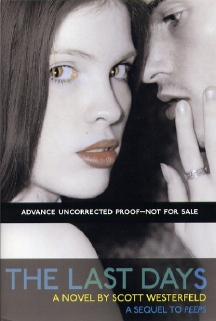 The Last Days by Scott Westerfeld
The Last Days by Scott Westerfeld
—–
I like Westerfeld’s writing style. Sometimes, it seems like what he’s writing is banal, and even a little too detailed in the minutiae, but it’s always relevant. There’s something about the pace, I suppose, that throws me off, but there’s never a question in my mind if I’m going to finish reading the book, or that I’m going to enjoy it.
The Last Days is the sequel to Peeps, a novel that I thought stood quite well on its own. I was hesitant to pick it up, but really, it’s Scott Westerfeld. I’m going to read it. It picks up more or less where Peeps left off, though not with the same characters. This time, the author focuses on an odd commingling of friends, which includes a musical genius, two guitarists who have been friends for ages, an obsessive-compulsive drummer of buckets, and a singer who’s a vampire. He uses the group to bring focus to the crumbling of society, as the vampire virus spreads through New York. The downfall is seen through their eyes.
Which brings to the point Westerfeld’s skill at characterization. The novel is narrated in the first person, but it’s narrated by all five of the members of the band. I didn’t realize this until the second chapter, but Westerfeld notes each chapter with the person who is speaking, but really, it’s not necessary. He gives enough clues in his narrative for you to be able to hone in on who’s speaking, but aside from that, each character has his or her own distinctive voice. The last time I saw a multiple first-person narrative that worked this well was in Sturgeon’s Godbody. That says a lot for Westerfeld and his talents.
Through the first half of the novel, I wondered why the author chose to make this a sequel, as opposed to a stand-alone novel. The focus was so much on the band members and their quest to secure a record deal, that I wondered why the author didn’t choose some other method for the decline of society. It served as a backdrop for the musicians’ desperation, but it also poignantly illustrated how they pursued their dreams, despite the seeming futility of it all. Once things became clearer, though, it tied in nicely with what was established in Peeps. Well … almost.
The ending is really hokey. Sorry, Scott, but it’s true. I’m not going to spoil it for anyone, because I think the story is well told, and raises some good points, but the way that everything comes together in the end smacked like an odd combination of The Stand and Tremors. I hesitate to say that it “jumped the shark,” but it at least jumped the minnows. The ambiguous ending of Peeps was appropriate, and the conclusive ending of The Last Days was, as well, but it just didn’t gel with me. Maybe it’s more appropriate for a younger crowd, as the book is marketed, but it seemed to fail with me.
In a way, this a pseudo-sequel to Peeps, in much the same way that Small Steps was a pseudo-sequel to Holes. I think there were more points connecting Peeps to The Last Days, but the overall feel was that it was a different story, attached to the same universe. This isn’t a bad thing, by any means, but it just makes me wonder what drives authors to connect their works when the stories are disparate.
Regardless, I think this is a book worth reading. It could stand alone as its own book, but there are some characters that appear in both novels, so it’s probably best to start with Peeps. I think it’s the superior book of the two, but both books together make a nice overall story.
-
Recent
-
Links
-
Archives
- March 2008 (2)
- February 2008 (1)
- January 2008 (3)
- December 2007 (1)
- October 2007 (2)
- September 2007 (3)
- August 2007 (10)
- July 2007 (7)
- June 2007 (8)
- May 2007 (6)
- April 2007 (5)
- March 2007 (3)
-
Categories
-
RSS
Entries RSS
Comments RSS